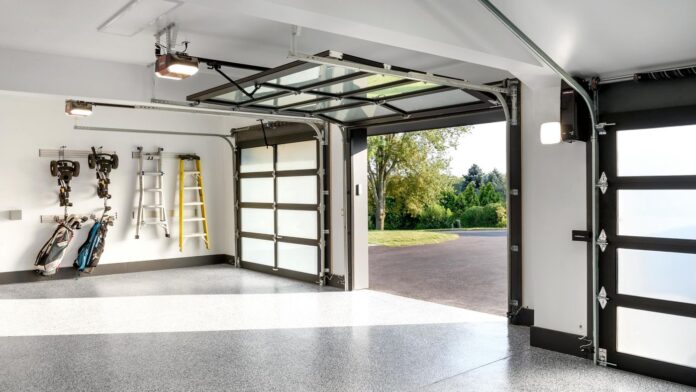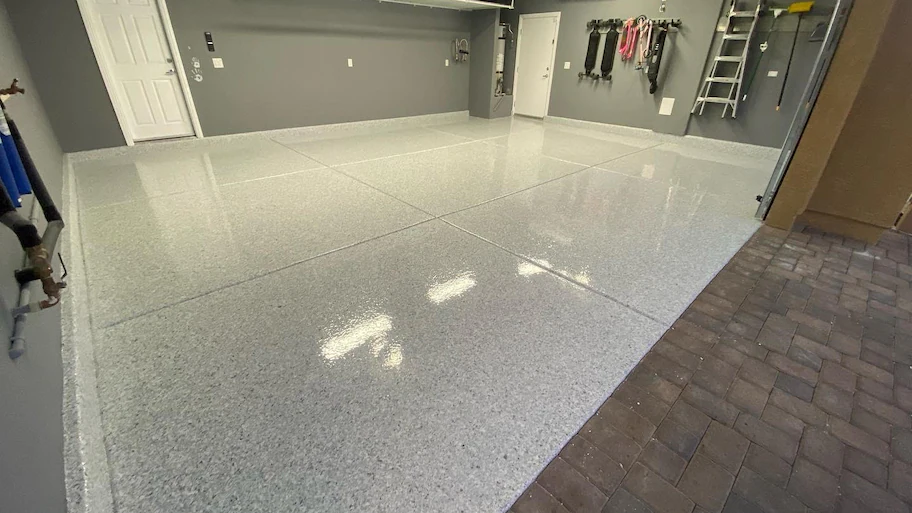As a flooring option, concrete is functional but not always the most attractive or durable. Concrete is susceptible to deterioration and cracking over time, especially if not constructed to industry quality standards, which can impact substrate integrity.
With epoxy flooring, you can seal your concrete to protect it, increasing its durability and strength with an attractive finish and many other benefits too.
What are the benefits of sealing a concrete floor with epoxy?
There are a number of great benefits from sealing your concrete with epoxy, including protection from damage due to:
- Abrasions
- Stains and light chemical spills
- Water
- UV rays
- General wear and tear
Compared to polished contrete floor, both flooring solutions offer a range of benefits to home and business owners. However, epoxy flooring does trump polished concrete in terms of look, toughness, safety, and versatility – it’s definitely worth investigating further.
How does epoxy seal concrete?
Epoxy is a topical sealant, which works by adhering to the concrete to create a hard, protective coating. The main advantages of using a topic sealer like epoxy is that it’s:
- Waterproof
- Very easy to clean and maintain
- Very durable
- Stain resistant
With epoxy garage flooring, you can choose from a wide range of attractive, decorative flake or coloured finishes, and you can add additional protective coatings like slip resistance to further enhance its usability.
What are alternatives to epoxy as a concrete sealant?
There are of course other alternatives to epoxy, including other types of topical sealants, such as acrylic, polyurethane, polyurea, and polyaspartics.
There’s also another type of sealant called a penetrating sealer, which makes concrete denser by forming a barrier without coating the surface. It does this by penetrating the concrete substrate to create a bonded seal by chemically reacting to the mineral in the concrete. Common types of penetrating sealers include silicates, silanes, siliconate and siloxanes.
While a penetrating sealer provides some level of water-repellence, it doesn’t achieve the true level of water-proofing that epoxy does. This means your flooring can still be susceptible to stains.
What’s the best sealant for my garage floor?
The best sealant for your garage floor will depend on the level of protection you’re hoping to achieve, and what sort of finish you want. Using a topic sealer like epoxy flooring will give you more benefits in the long run, including a surface that’s:
- More durable, and will last a lot longer than other sealers or untreated concrete
- Waterproof and stain resistant, providing a hard coating that stops moisture and spilled liquids from seeping into the concrete and the need for drainage holes.
- Protected from damage due to abrasions like dropped tools and other equipment
- Easy to maintain and clean, without needing fancy cleaning products, time-consuming maintenance routines.
- Able to have other protective coatings added to it, including a slip-resistant coating or a full UV proofed coating for areas that see a lot of sun exposure (including exterior surfaces)
- Customisable in terms of finish, with a range of decorative flake, coloured or even metallic finishes available
Consult with epoxy flooring experts
To achieve attractive, durable, low maintenance and highly functional garage floor protection, consult with an experienced and knowledgeable epoxy garage flooring expert. A high-quality epoxy floor coating will give you an outstanding result, and one that will look great for years to come.



















